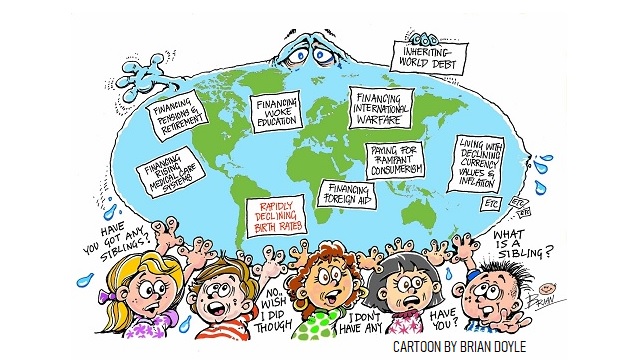Knock, knock? We’re on a path to extinction! Anyone interested?

South Korea just broke its own grim record, reporting the world’s lowest fertility rate at 0.78 children per woman. An unprecedented birth dearth.
South Korea is supposedly a “wealthy” country, but it will not be wealthy without children. The disappearance of East Asia and their ancient cultures proceeds apace. Japan and China are already shrinking with no end in sight. So many young people are not even interested in dating. What for? They have smartphones, video games and social media.
The same situation plagues the West. In what was once known as Christendom – Europe, Russia, the Anglosphere, Latin America – Christianity is being supplanted by thoroughly modern secularism. “Go forth and multiply” does not apply.
Fertility is falling everywhere. Why?
In prehistoric times, natural selection prevailed. Those best able to adapt survived and produced more offspring. Charles Darwin is credited with the discovery of this principle, though he simply rendered reality into writing. Natural selection became the basis for his theory of evolution.
For people at the mercy of the elements, death was a constant companion. The bearing of children just came naturally to perpetuate family and tribe. The survival instinct was strong. Five-star restaurants, two-car garages and family planning were unknown.
Then came civilization. Sustained commerce between small settlements and the rise of agriculture spawned economies and social stability. Between 4000 and 3000 BC full-fledged civilizations arose. Finding food, clothing and shelter was no longer a do-or-die proposition. Large-scale cooperation emerged. Natural selection gave way to social selection. Civilization presented diversions such as art, science, education, politics, wealth, leisure, and power.
Fast forward to the 19th century. In 1800 no transportation system rivaled the old Roman roads. Nor was there a postal service as proficient as Caesar’s. That changed with the Industrial Revolution. The Idea of Progress, the belief that history ineluctably proceeds towards material well-being and a better life, took hold and superseded religious faith. This belief emerged from Enlightenment empiricism. Mankind had come to believe in itself: Master of the Universe. Modernism was born.
Modernism was inextricably linked with progress. What great things humanity can do! How could anyone possibly argue with that? Modernism is defined by the Oxford dictionary:
A tendency in theology to accommodate traditional religious teaching to contemporary thought and especially to devalue supernatural elements.
According to Merriam-Webster it is:
a movement toward modifying traditional beliefs in accordance with modern ideas, especially in the Roman Catholic Church in the late 19th and early 20th centuries.
Note the words “accommodate” and “modifying.” It’s not rocket science – religious faith, traditional values and common sense were subordinated to “modern” notions of “liberty, equality and fraternity.” In the West that eventually morphed into “diversity, equity and inclusion” (DEI).
Where is the family in all this? Good question. Modernism continually moves the goal posts. In the West the very definitions of marriage, family and morality are up for debate. Moral relativism destroys social cohesion, a form of “social security” money can’t buy. That is gone in the West and fading fast in the East.
The West’s Industrial Revolution, along with the utopian Idea of Progress, eventually took hold worldwide. The prevailing wisdom was that humanity was improving. The New Soviet Man concept is just one example.
But humanity was not improving. It was the same old humanity thriving under improved conditions – e.g., rising living standards, a critical distinction. Are we really more intelligent or somehow cognitively superior to the ancient Greeks or Persians? Will we ever learn that all the DEI social engineering in the world does not change human nature?
Modernism’s materialism, consumerism and convenience are secular values. How can God, faith, or belief in the transcendent help me get ahead in this world? Well, there’s the Prosperity Gospel. But I digress.
With the advent of Modernism, civilization’s diversions – art, science, politics, wealth, leisure and power – became preoccupations, ends in themselves, at the expense of family. We slipped our spiritual moorings.
Modernism’s mammon mania means that nothing should impede the pursuit of prosperity. We have creature comforts and high-tech gadgets galore. The old “bread and circuses for the masses” has long been surpassed. Materially things are better. What could go wrong?
But are we homo sapiens getting ahead of ourselves?
Has the complexity of civilization exceeded the human capacity to maintain and manage it, akin to a structural overload in engineering? Gleaming civilization with all its baubles and accoutrements has blinded us to certain eternal truths. Losing faith means losing our moral compass and survival instinct. Christianity is wilting in the West. The fatalistic Oswald Spengler said that when the continuation of your kind on earth becomes a matter of debate, it’s over. (To give you a taste of Spengler, he’s the guy who said, “Optimism is cowardice”.)
Absent religious faith or a common Zeitgeist larger than ourselves, civilization can mutate from benefit to burden.
Burden? Progress is a double-edge sword. The environment is fouled for economic gain. Institutions master rather than serve humanity. Perpetual mortgage and credit card debt must be serviced. Unfettered by faith, moral constraints or a common ethos, misery abounds. Artificial intelligence is amazing, but it is also a dehumanizing job-killer.
Modernism prioritizes economic growth, imperialism, and affluence. Everything, including people, is valued solely for economic utility. Mammon mania undermines the family. People choose between family and career as if there is a moral equivalency. For humanity at large, that is choosing between life or death. The produce-and-consume treadmill holds us captive to the lust/need for lucre. No creature breeds well in captivity.
Governments are devising all manner of schemes to reverse falling fertility. Hungary and Scandinavia are leading the way with subsidized childcare, affordable housing and expanded parental leave. It is too early to assess the impact. China is crafting the world’s most comprehensive fertility initiative to date. This includes mapping data on unmarried youth.
Japan has initiated a government-sponsored dating service. The Japanese call it konkatsu, or “marriage hunting.
Russia propagandizes for larger families. President Vladimir Putin has revived Josef Stalin’s Mother Heroine award of US$16,000 for mothers who bear ten children or more.
China, Russia, Hungary, and other countries are restricting abortion. With shrinking populations many are becoming aware of the critical necessity to choose life.
There is talk of taxing the childless. Renowned demographer Dr Paul Morland floated the idea in his Sunday Times op-ed “Should We Tax the Childless?” His reasoning: “We are approaching a population emergency, and if well-informed people cannot discuss these matters, the field is left to cranks and fanatics.” The idea was not well received; one magazine described it as a “rage-inducing viral masterclass”.
There is already overseas “bride-hunting” to compensate for gender deficits. The Faroe Islands is an example. There is even chatter about importing women from higher-fertility countries for breeding purposes, akin to livestock management.
Here’s an idea. Redefine prosperity in terms of intact families and children, rather than in fungible fiat currency per household.
Family life is being sacrificed on the altar of modernity. Shouldn’t government be doing some of the sacrificing? Multiple military bases, ginormous stadiums and over-the-top infrastructure projects are not as important as survival. Fund family-friendly initiatives instead.
How about meaningful tax relief for the middle class? In the US, real wages (those adjusted for inflation) have not risen since the 1970s. With everyone busy working, homes become dormitories. Living to work is unhealthy.
Reconfigure national economies and pay (bribe) people to have children. With our very survival at stake, just do it. But what does that say about our values?
As Henry David Thoreau observed, “There are a thousand hacking at the branches of evil to one who is striking at the root.” Tight money is merely a symptom contributing to the family’s decline. The root cause is spiritual.
The world is ageing because we are not replacing ourselves. Why? The family is no longer the center of life. Children are a bother. They’re too expensive. It doesn’t matter if we die out. The survival instinct is gone. Is a brave new dystopian world ahead?
The most advanced civilization can’t fool Mother Nature. Is this natural selection coming back?
Humans, those self-aware bipeds with prominent prefrontal cortexes, emerged about 300,000 years ago. Civilization has been around only 6,000 years. Is civilization an aberration? Are we regressing to barbarism?
Modernism has failed. We’re on the path to extinction. The world’s most productive populations are the fastest declining.
The future of the family depends on individual and societal priorities. Priorities reside in hearts and minds. Only spiritual rebirth can turn things around.
How can we help that happen?
AUTHOR
Louis T. March
Louis T. March has a background in government, business and philanthropy. A former talk show host, author and public speaker, he is a dedicated student of history and genealogy. Louis lives with his family… More by Louis T. March.
RELATED ARTICLES:
Challenging the cosy corporate LGBTQ consensus
‘Critical social justice’ theory is really making inroads into US schools
EDITORS NOTE: This MercatorNet column is republished with permission. ©All rights reserved.




